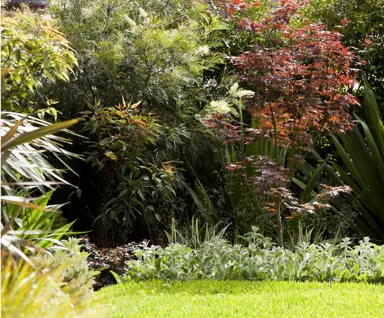
The Plant Company grows, sells, and ships Meryta plants throughout NZ. We pride ourselves on producing high quality plants and seeing the joy from our customers when they receive them. We do hope you enjoy them and support this NZ business that is passionate about Meryta plants.
Meryta sinclairii, commonly known as the Puka Tree or Puka Plant, is a NZ native shrub with a lush and tropical appearance. It bears large and...
Meryta sinclairii 'Moonlight' is a fantastic NZ native shrub due to its tropical appearance. It bears large and bold, variegated leaves and will grow...
Meryta sinclairii ‘Cream Edge’ is a bold New Zealand native shrub or small tree prized for its large, glossy green leaves edged with creamy white...
Choose a full sun or partial shade position with good drainage for your Puka. The hole should be dug to at least 50-75% deeper and wider than the container the plant is currently growing in. A planting spade makes the hole digging a lot easier. The Plant Company recommends incorporating compost or sheep pellets into the soil to provide additional organic material, but this is not essential. Do not put fertiliser in the bottom of the hole, rather spread that on the soil surface after planting, and preferably do this when the plant is actively growing in spring.
Remove the plant from the container it is growing in by either pulling it free or by cutting the bag. We recommend cutting the bag or container, especially for larger grade plants, to minimise any chance of damaging the roots. If the roots have been growing in a circle or are all bound up you can tease them apart if you want but this is not essential. Similarly, you don’t need to remove any of the growing media. The Plant Company does not recommend cutting the roots, even if the plant is root-bound as this offers no benefit. This is explained in our article, Managing Rootbound Plants.
Now place the plant in the hole and make sure it is level with the soil surface before filling in around it. If it is above the soil surface, dig more out. If it is below, put in more soil and retest the level. Once the plant is set level with the soil surface, add more soil gradually and firm it around the plant using gentle pressure as you go. Scatter Native Plant Fertiliser across the soil surface after planting and the give the plant a good watering. If it is a tall tree, you may want to consider staking it.
Yes, you can grow a Puka (Meryta sinclairii) inside, but it will require some special care. They prefer a bright, warm spot with good levels of natural light. They also need well-drained soil and regular watering. Be sure to locate it away from drafts or areas where it will be brushed against.
Puka trees are moderately fast growing. In ideal conditions, they can grow up to 2 metres tall in their first 5 years. However, their growth rate can be slowed down by factors such as poor soil quality, lack of sunlight, and pests and diseases. To encourage rapid growth, plant your Puka in a sunny spot with a well-drained soil. Water regularly, especially during the first year after planting and fertilise in spring with Native Plant Fertiliser.
Puka trees can grow up to 8 metres tall, with a trunk diameter of up to 50 centimetres. They are a large, evergreen tree with a dense crown of glossy leaves. They are relatively slow-growing, but they can reach maturity within 10-15 years.
If you are considering planting a puka, be sure to choose a spot where it will have plenty of room to grow. They are great for providing shade and privacy, and their beautiful flowers and fruit make them a valuable addition to any landscape.
Caring for a Puka tree is about making sure the plants are thriving. Here are a few tips for success:
With proper care, your puka tree can be a beautiful and low-maintenance addition to your landscape.
Puka trees are relatively resistant to pests and diseases, but they can be susceptible to a few problems, including:
The issues are easily controlled with a general insecticide or fungicide.
Puka trees are generally low-maintenance and don't require frequent pruning. However, there are times when pruning might be necessary:
When to prune:
The best time to prune a puka tree is in spring when the tree is actively growing. Try to avoid pruning in autumn or winter as this can make the tree more susceptible to disease.
How to prune:
Don't remove more than one-third of the tree's canopy at any one time. This can stress the tree and make it more susceptible to disease.
A Puka Tree is a New Zealand native tree with the latin name, Meryta sinclairii. It is large and evergreen with glossy, wavy leaves and purple fruit. Puka trees are native to the Three Kings Islands and the Hen and Chickens Islands, and parts of New Zealand.
Puka trees are found in the Three Kings Islands and the Hen and Chickens Islands, two groups of islands off the coast of Northland. Puka trees are also grown in the Auckland, Wellington, and Christchurch botanical gardens.
One of the best places to see Puka trees is at Puka Park Resort on Mount Pāuanui, Coromandel Peninsula. This luxury resort is surrounded by native bush, including Puka trees.
The wood from a Puka tree is strong and durable, and is often used in carving and furniture making. It can also be used in boat building, musical instruments, and sporting goods. It is a popular choice for carving because it is easy to work with and holds its shape well.
Bark from a Puka tree is used in traditional Maori medicine to treat a variety of ailments, including skin conditions, respiratory problems, and digestive problems. It contains a number of medicinal compounds, including flavonoids and tannins. These compounds have anti-inflammatory, antioxidant, and antimicrobial properties. The bark can also be used in the form of a tea or poultice.
Puka trees can be grown from seed or from cuttings.
The Puka tree is a significant tree in Māori culture. It is considered to be a sacred tree and is associated with life, death, and rebirth. It is also a symbol of strength and resilience.
The Puka tree is also a popular symbol of New Zealand culture and is often used in New Zealand art and literature.
Meryta sinclairii 'Moonlight' has the following characteristics:
Meryta sinclairii 'Moonlight' is a beautiful and unique plant that can add a touch of the tropics to any garden. It is relatively easy to care for, and is a good choice for gardeners of all levels of experience.
The Plant Company has, and only stocks high quality Meryta sinclairii plants. We appreciate that buying online is somewhat of a leap of faith, given you are putting your trust in us. Please rest assured that we only ship plants that we would happily buy and plant ourselves. Trust in The Plant Company to supply your Puka tree needs and allow us to impress you both with our quality and service. Our impressive Google Rating shows we are good at what we do!
Puka trees generally start at about $25 for a reasonably sized plant and can go to $300 for a much taller and dense plant that is 18-24 months older. The Plant Company recommends that very small plants are avoided as they can fail and take a long to establish. Any savings you thought you were making by buying small are often lost when the plants are replaced.
Sometimes you just don’t want to wait for a plant to grow, and you want the instant display now. The Plant Company has large grade Puka trees available, and often has even larger grades available that are not listed for sale on our website. Please contact us and our amazing team will let you know options and pricing for delivery to your desired location.
Puka trees, also known as Meryta sinclairii, offer a variety of benefits for homeowners and landscapes. Here are some of the key advantages:
Aesthetics and Landscape Design:
Environmental Benefits:
Puka trees offer a compelling combination of aesthetic appeal, environmental benefits, and ease of care. If you have the space and appreciate their unique characteristics, a Puka tree can be a valuable addition to your landscape.
Whether you need assistance finding the plant you’re looking for or you simply want to know more about who we are and what we do, we invite you to get in touch with us today. A member of The Plant Company team will get back in touch as soon as possible.


